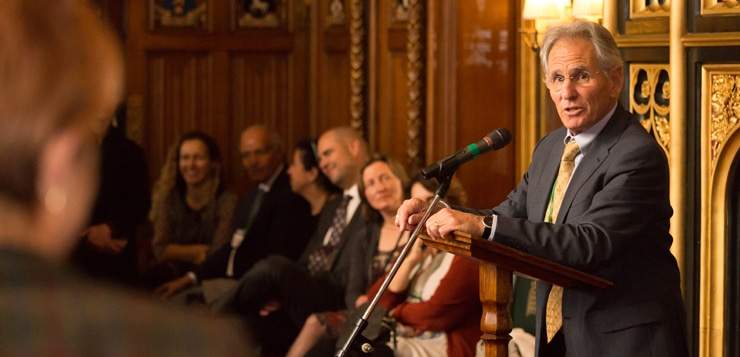Something quite extraordinary happened in the UK House of Commons on October 17th. Forty politicians from 14 countries sat together in silence, practicing mindfulness with the guidance of Jon Kabat-Zinn. UK Ministers sat in contemplation alongside delegates who had flown in from as far away as Israel, Sri Lanka, Croatia and Sweden to explore their interest in mindfulness as an instrument of positive change. The world’s first international congress of mindful politicians then engaged in lively discussion on how they might follow the UK in making mindfulness a serious matter of public policy.
Delegates shared stories of their own journey to mindfulness practice through depression and anxiety, and accounts of profound overcoming in the face of life-altering illness and injury. Mindfulness, said Sports Minister Tracey Crouch, had helped her cope when therapy wasn’t appropriate, leaving her a passionate advocate of the practice in the professional context and determined to discover where it could be of most service in the policy landscape. An in-depth symposium brought guests up to speed with the latest news of mindfulness in UK healthcare and criminal justice, including eloquent first-hand testimony from Mark, an ex-inmate introduced to mindfulness after 30 years in and out of prison: “it gave me my life back.”
The event was born 18 months previously in the office of US Congressman Tim Ryan. The Ohio Democrat, now tipped as a 2020 presidential candidate, is a dedicated practitioner who advocates mindfulness as a strategy for sanity amid the chaos of politics—and does all he can to further mindfulness stateside, not least in the care of military veterans. Congressman Ryan said in 2014, “I came out of (my first retreat) with a whole new way of relating with what was going on in the world… like any good thing that a congressman finds—a new technology, a new policy idea—immediately I said, ‘How do we get this out?’”
Encouraging a Kinder Approach to Political Dialog
In October of 2015 the Mindful Nation UK report launched, signaling promising movement in British policy, with the adoption of recommendations for widened access on the National Health Service and a national working group looking at implementation in the criminal justice system. We now wondered how we could build on this opportunity to establish an international network of legislators interested in mindfulness. Members could draw support from each others’ progress, pointing to the UK and Sweden as legislatures successfully implementing evidence-based mindfulness policies. Our hope in cultivating these friendships was not only to aid the proliferation of mindfulness, but to do so in a way that transcends the sectarian political tone that the world is so ready to grow out of, and models deep, courageous cooperation.
There is an affinity amongst those who have been on this mindfulness course, and a more considered approach to exchanges of differing views. —Conservative Co-Chair of the MAPPG, Tim Loughton MP
The progress of mindfulness in UK politics has been refreshingly cross-party, reinforcing the belief in those involved that there is more to unite us than to divide. The Mindfulness All Party Parliamentary Group (MAPPG) grew out of a Parliamentary mindfulness program for MPs and peers, which has so far seen over 160 participants. Many have remarked on the way this shared experience softened their sense of the other, seeing colleagues from across the house as allies and encouraging a kinder approach to dialogue. Conservative Co-Chair of the MAPPG, Tim Loughton MP said recently, “There is an affinity amongst those who have been on this mindfulness course, and a more considered approach to exchanges of differing views.”
Indeed, in a political space that we have learned to view as deeply divided, it can take an outsider to remind us how much progress has been made. Jon Kabat-Zinn hailed the efforts of the MAPPG as “the embodiment of wisdom: simply to drop in together and see what commonalities are possible.” And in a room filled with politicians from diverse nations, there was palpable agreement that something like this could never have happened 10 years ago—that while the world is experiencing some frighteningly divisive energies, elsewhere boundaries are breaking down in quite a radical way.
Those who have followed progress since Kabat-Zinn pioneered secular mindfulness in the late 1970s, have witnessed a journey from relative obscurity to exploding mainstream enthusiasm. After decades operating on the margins, many are dazed to find themselves riding this crest of popularity all the way to Parliament—as much a cause for caution as for celebration. But despite being somewhat indebted to the ‘trend’ of mindfulness, there’s something reassuringly healthy about the growth of mindful politics.
Unsurprisingly, hearsay alone proved insufficient to convince MPs en masse to consider its role in policymaking. As with most other groups, it was the genuine transformative effect of personal practice felt by MPs and peers that galvanized them to share the benefit—to investigate how contemplative practice might be put to work to serve a future society. While dedicated practice remains at its core, we have little to lose and everything to gain from more mindful politics across the world.








